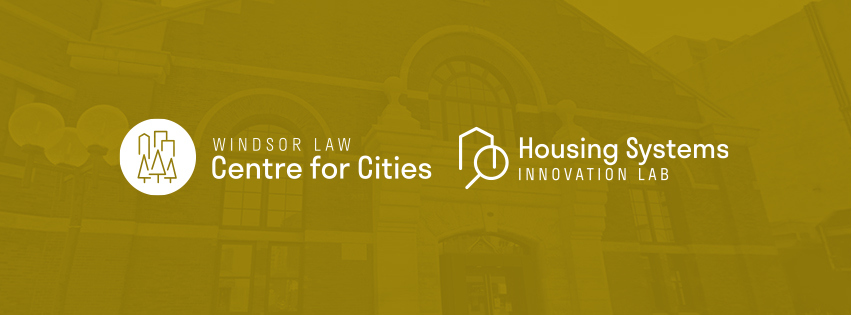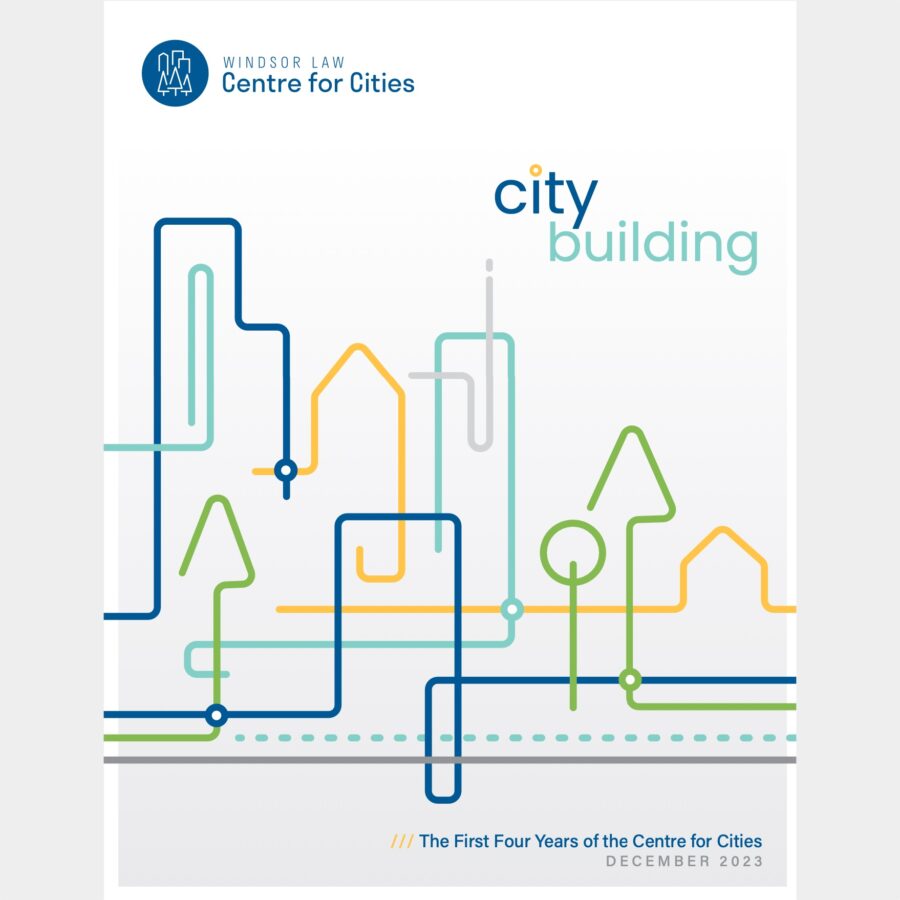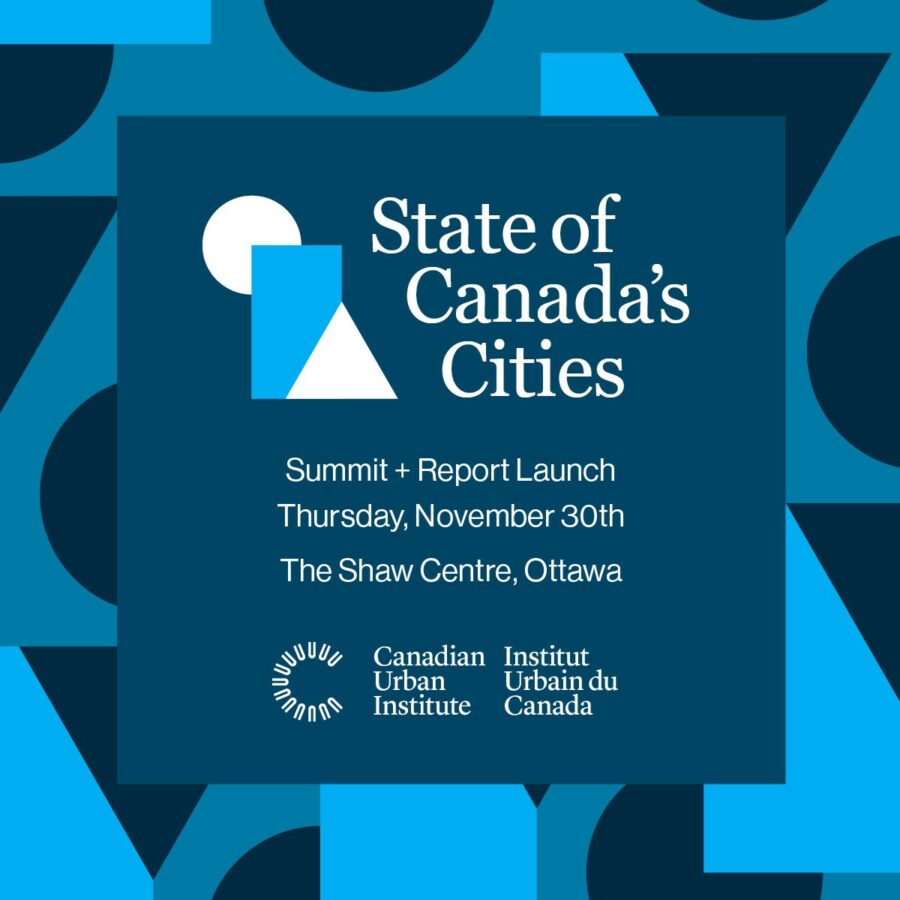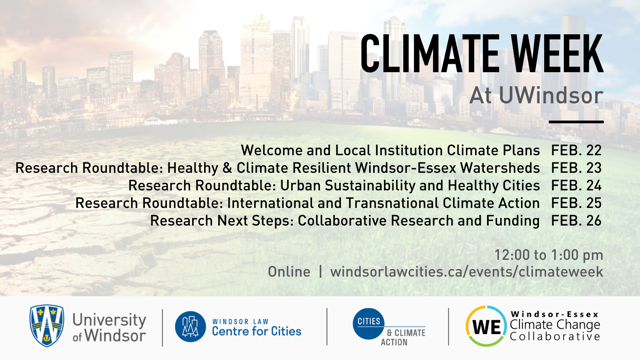
Climate Week at UWindsor brought together UWindsor researchers, community leaders and organizations on climate action and research
(11 March 2021) by Mikal Daniel.
From February 22 – 26 the first Climate Week @UWindsor was held. It was a week of activities on climate action and research at the University of Windsor with its community partners. The week was organized by the Windsor Law Cities and Climate Action Forum (CCAF), the Windsor-Essex Climate Action Collaborative (WEC3), and the Windsor Law Transnational Environmental Law and Policy Clinic (TELP), with the support of the University of Windsor Office of the Vice President of Research and Innovation (OVPRI), and the Great Lakes Institute for Environmental Research (GLIER).
Climate week was opened on Monday 22 February with a welcome and comments from UWindsor Vice President of Research and Innovation Dr. Michael Siu. The session then focused on Local Institution Climate Plans. Nine local institutions were represented and each speaker presented their institution’s progress on climate action planning. The session was led off by University of Windsor President Dr. Robert Gordon. Other speakers were:
- Gary McNamara, Warden, County of Essex
- Janice Kaffer, CEO, Hotel-Dieu Grace Hospital (HDGH)
- Tania Jobin, Chair, Essex Region Conservation Authority
- Joseph Picard, Director of Education, Conseil Scolaire Providence
- Karina Richters, Climate Change Specialist, City of Windsor
- Peter Wawrow, Director, Applied Research and Development, St. Clair College
- Joseph Ibrahim, Superintendent, Windsor Essex Catholic District School Board (WECDSB), and
- Kathleen Quenneville, Energy & Environmental Officer, Greater Essex County District School Board (GECDSB).

Of particular importance, UWindsor President Gordon announced new climate commitments coming from the University. President Gordon said that he will establish UWindsor’s net zero emissions goal within the coming months, create a “long-overdue” sustainability directorate to help guide this work, and allocate more funding for sustainability projects on campus with a focus on those which will reduce our campus carbon footprint.

President Gordon reported on UWindsor having signed on to the United Nations Principles for Responsible Investment (UNPRI). Through 6 principles, the UNPRI work to “understand the investment implications of environmental, social and governance (ESG) factors” and to “support its international network of investor signatories in incorporating these factors into their investment and ownership decisions.”
In making a public commitment to reaching carbon neutrality, UWindsor will join other universities such as Queen’s University (2040 neutrality commitment) and the University of Waterloo (2050 commitment), and Université Laval which achieved carbon neutrality in 2015.
On Tuesday February 23, the first of three Research Roundtable focused on Healthy and Climate Resilient Windsor-Essex Watersheds. It was co-hosted by the Essex Region Conservation Authority (ERCA)’s Climate Change Specialist, Claire Sanders and Water Quality Scientist/Project Manager Dr. Katie Stammler, and Dr. Catherine Febria of UWindsor’s Great Lakes Institute for Environmental Research (GLIER). These institutions highlighted existing technical data, and invited researchers to outline briefly any existing and future projects related to climate change in the context of the Windsor-Essex region’s natural heritage and watersheds. The major take-away from this session was the potential for community partner organizations, UWindsor scientists and other stakeholders to ensure that UWindsor researchers are able to support the research needs of watershed organizations in the region. This roundtable opened up dialogue and a space where those interested and involved in this work could continue to build networks and collaborate with each other.
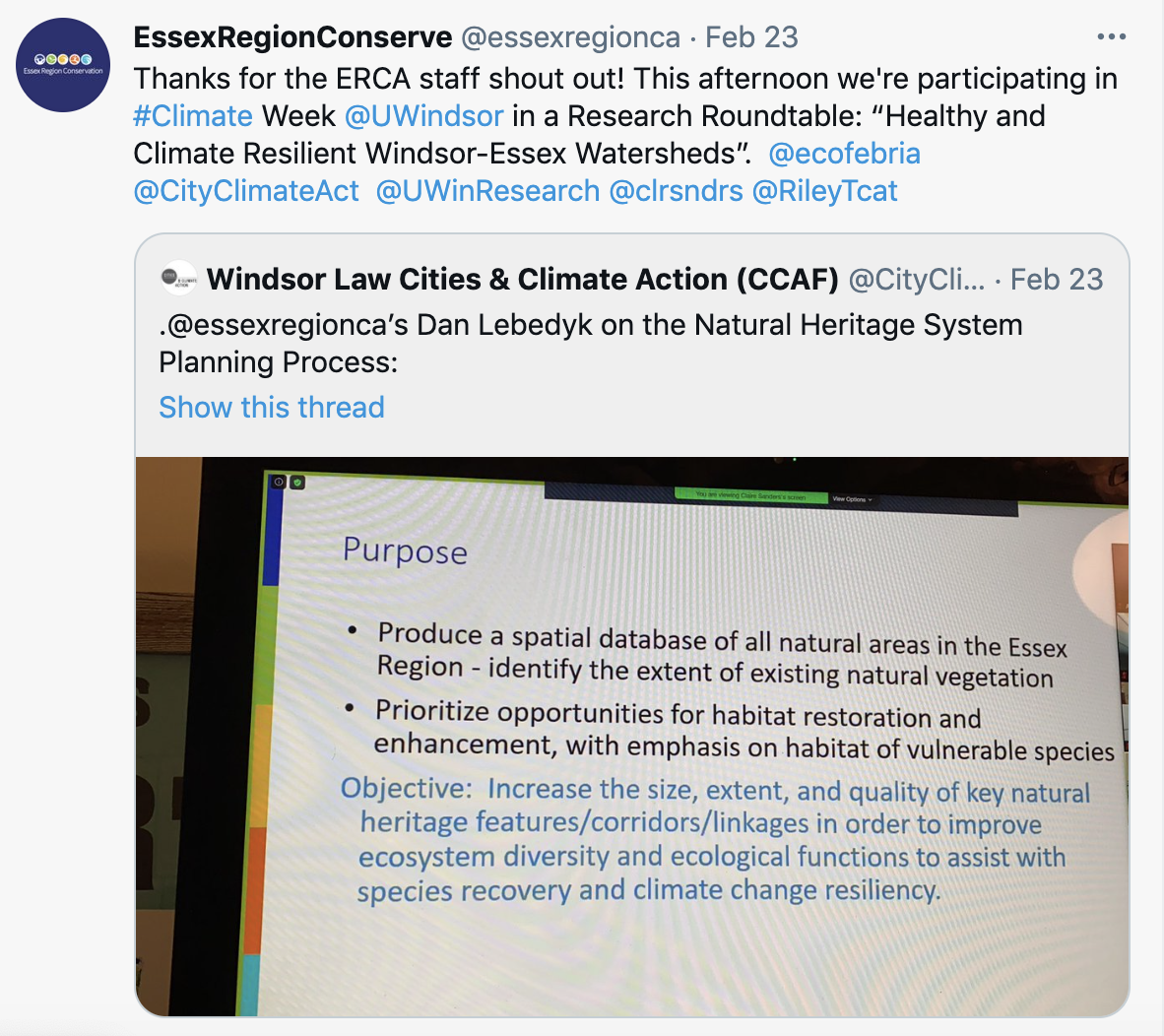

On Wednesday February 24, a research roundtable focused on Urban Sustainability and Healthy Cities was hosted by the Windsor Law Centre for Cities, and facilitated by Centre Director Dr. Anneke Smit. Attended by 35 participants, 14 researchers from five different UWindsor faculties and research-involved community partners spoke about their work in urban spaces, with emphasis placed on community-facing and collaborative research. The roundtable took as a starting point that a climate lens must now be be applied to all issues – land use planning, inclusion and diversity, health, transportation, affordable housing, architecture, etc. The UWindsor researchers involved in ongoing efforts to build an urban sustainability research framework with Wayne State University reported on this work as well.
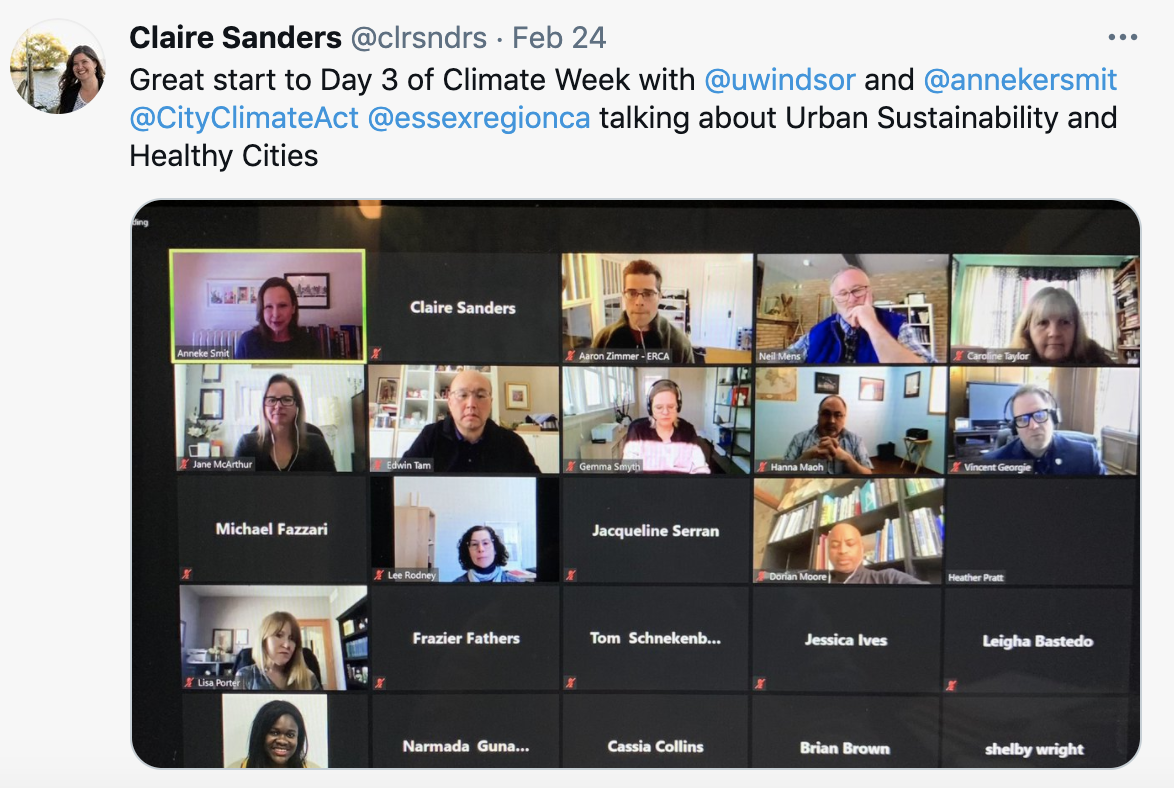



Thursday February 25 saw the last of the three Research Roundtables, focussing on International and Transnational Climate Action. Windsor Law Assistant Professor and TELP Director Dr. Patricia Galvâo-Ferreira hosted this session. During this discussion, climate research taking place in Windsor-Essex was situated in the context of the international climate regime, particularly the Paris Agreement, and we heard about existing or upcoming transboundary or transnational climate initiatives.
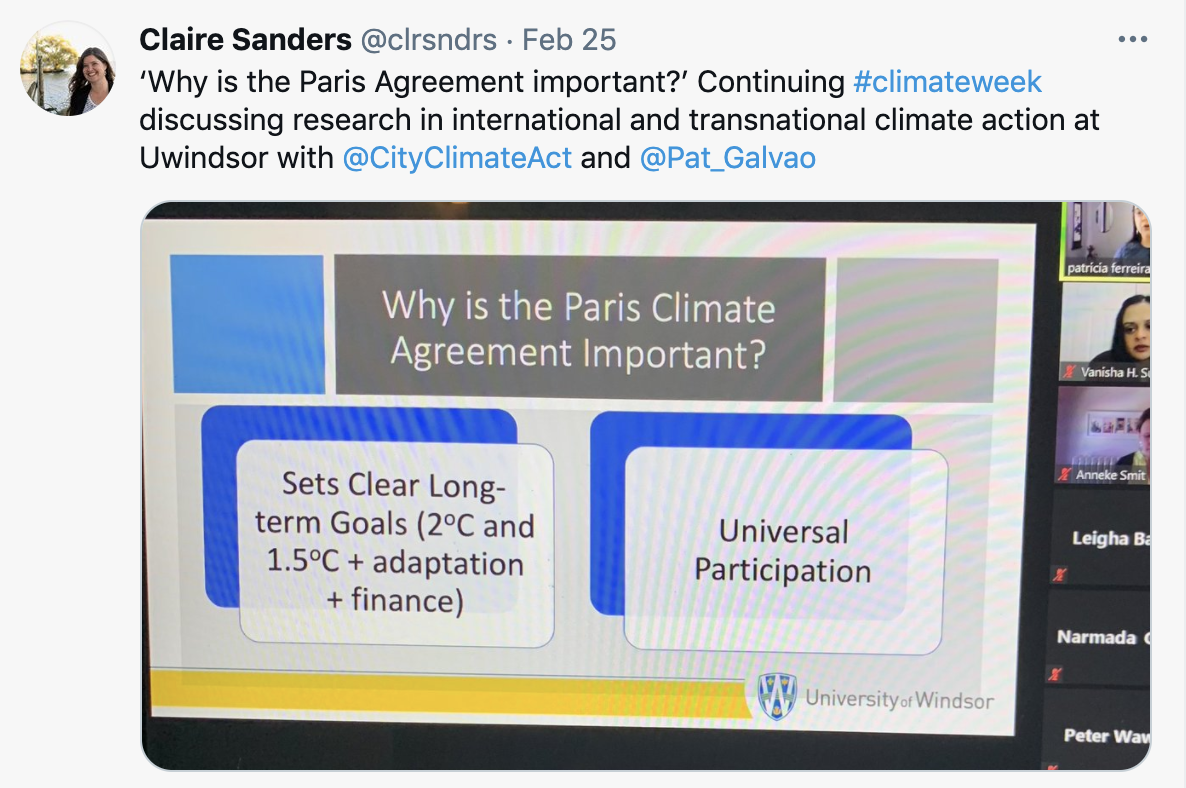
A comprehensive climate adaptation program for the Great Lakes was discussed (a recurrent recommendation of the International Joint Commission (IJC) Water Quality Board since 2003). The IJC is currently working to advance a proposal on what the main elements of such a transnational Great Lakes climate adaptation plan would look like, to facilitate negotiation between the United States and Canada’s governments, the two members of the binational Water Quality Agreement. There is, therefore, an opportunity for engagement by those working on climate adaptation at UWindsor and Windsor Essex, in partnership with American and Indigenous organizations across the Great Lakes, to produce research and outreach to help design and to support this much needed initiative. We considered that this topic would fit well in the Wayne State/UWindsor research collaboration, and in particular cooperation on the Sustainable Development Goals in this corner of the US-Canada border, taking into account Goal 13 on climate action.
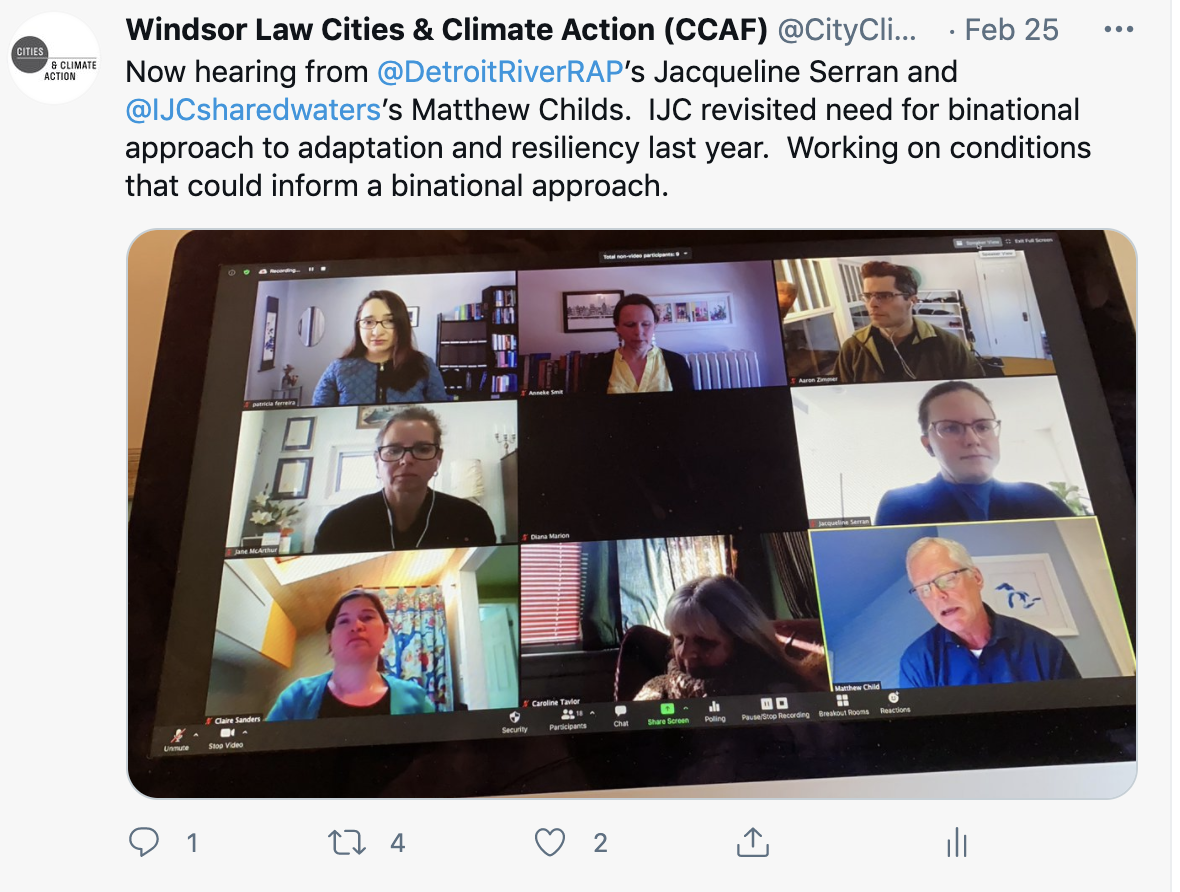
We also heard about the work that ERCA has undertaken with American partners on environmental issues along the Detroit River, and on research on transboundary air pollution and female health related to a cancer cluster in the Ambassador bridge, among other initiatives. The main takeaway is that our border location really facilitates building international and transnational research collaborations, and we should definitely continue building on this strength to find innovative ways to address the climate challenge through partnerships across our borders.
On Friday February 26, we ended Climate Week with a session dedicated to Collaborative Research and Funding for Climate-Related Research. The Research Officer team from UWindsor’s Office of Research and Innovative Services (ORIS) gave a thorough presentation on the external research funding opportunities available for researchers and research teams working on climate-related projects.
MP Irek Kusmierczyk (Windsor—Tecumseh and Parliamentary Secretary to the Minister of Employment, Workforce Development and Disability Inclusion) concluded the session with a brief explanation of the federal government’s new climate plan and the important place of climate research in helping Canada to reach its net zero emissions targets. Kusmierczyk, who also holds a PhD in political science, noted that UWindsor researchers and their community partners are very well poised to lead in Canadian climate research. He lauded Climate Week participants collaborative approach to climate research, and offered his support as they work to build teams and seek research funding.
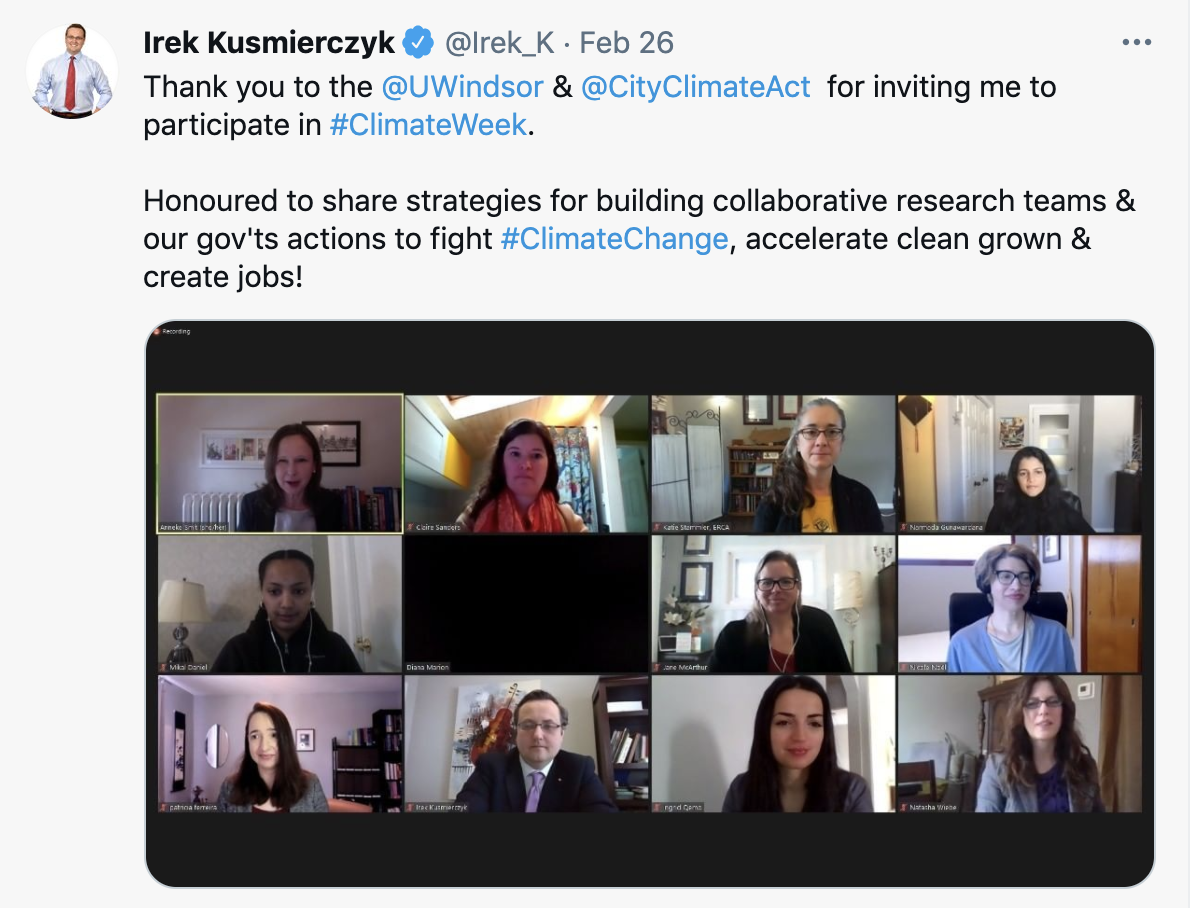
Overall it was an incredible week which helped move the University of Windsor and the Windsor-Essex community forward on research-informed climate action. We are very thankful to everyone who participated in the sessions, and to those who attended. Recordings of the Monday and Friday sessions are available here.
Mikal Daniel is a Windsor Law JD student and a student member of the Windsor Law Cities and Climate Action policy clinic.
